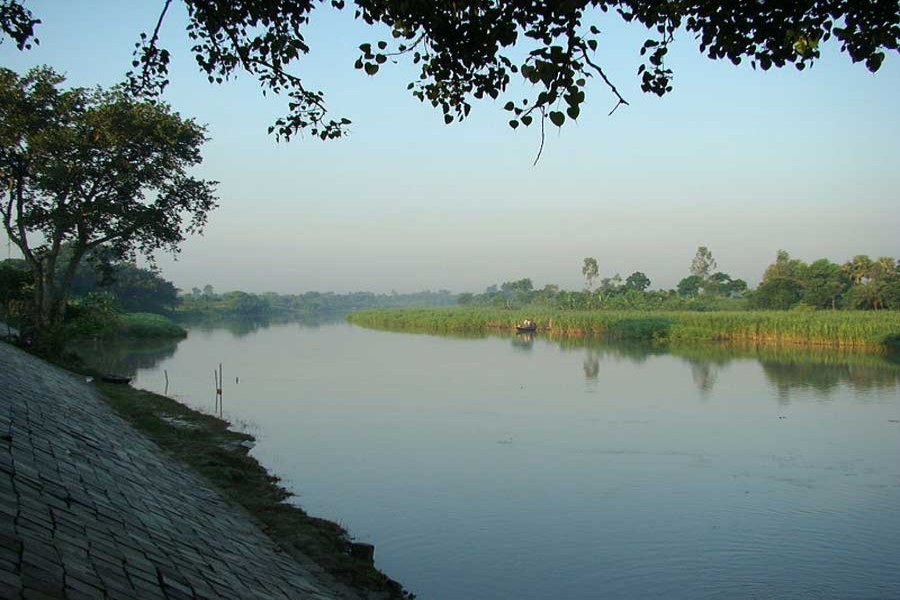Prime Minister Sheikh Hasina approved a master plan recently to free all major rivers in and around Dhaka and Chattogram cities from encroachment and pollution by 2030, according to reports. She directed all concerned to work to this effect 'without any delay'.
As per the master plan, the government from January 2026 will start relocating factories that discharge liquid waste to a special zone. The zone would have facilities to treat their discharge and ensure that the factories use environment-friendly technologies from 2030.
The plan also fixed December 2021 for the authorities concerned to complete demarcation of the rivers and identify legal issues, if any, to stop river grabbing and maintain navigability.
In the 10-year-long plan of action to save the rivers, the government identified three major tasks -- stopping pollution, maintaining navigability, and preventing river grabbing.
Several agencies and ministries are now working under the supervision of a 25-member committee led by the LGRD minister. Some of the work would be monitored directly by the Prime Minister's Office.
In 2007, the government and the World Bank jointly conducted a study which found that around 7,000 industries in and around the capital were discharging 1.5 million cubic metres of liquid waste into the rivers every day. It also found that 61 per cent of the liquid waste was from factories and the rest from homes.
By 2022, the government plans to demarcate the rivers as per the documents available at the land record office, district administration office, Rajdhani Unnayan Kartripakkha (Rajuk), and Chattogram Development Authorities (CDA). It plans to evict grabbers after demarcation but continue the effort.
As per a recent report of the National River Conservation Commission (NRCC), there are 49,162 river grabbers in the country. The report did not mention river and canal grabbers in the capital.
Between 2022 and 2025, the relevant ministries will complete formulating laws and guidelines, if required, for protecting the rivers. The immediate requirement is that concerted efforts should be given to protect rivers from encroachment.
There is no denying that most of the rivers in north-central, north-east, south-east, south-west and Hill Tracts river-zone of the country are now on the brink of being dead due to various human interventions like unplanned road and dam construction.
Immediate conservation efforts including registering all the remaining rivers crisscrossing the country are very crucial as the rivers are vanishing from the map. Moreover, unilateral water withdrawal by numerous hydroelectric projects in India, Bhutan and China had already made major river basins vulnerable including Brahmaputra and Surma-Kushiara.
Alongside ensuring safe drinking water, sanitation and development of rural roads for the rural people, the ministry has also many tasks, including ensuring drainage and waste management and stopping river pollution. The Prime Minister asked the ministry officials to finish work speedily in a planned and proper way for the country's development.
River experts, on the other hand, underline the need for streamlining the government's river saving initiatives as the major river basins in the country were being vulnerable due to unilateral water withdrawal by the upstream countries. In order to ensure benefits of rightful share, water diplomacy by Bangladesh is crucial for effective negotiation among the upstream and downstream countries.
On the other hand, an effective commission with necessary legal instruments could check riverbank encroachment by influential goons. Many a time, the government took up dredging projects--with nearly entire dredging machines owned by government and private companies--to regain navigability and life of the drying up rivers. But most of the initiatives ended in failures.
Very recently, the country's top judiciary has given a landmark judgment in an attempt to save the country's rivers and water bodies from illegal encroachment and pollution. A High Court bench declared rivers as living entities and assigned the National River Protection Commission (NRPC) as the 'legal guardian' in protecting water bodies, canals, swamps, shorelines, hills and forests.
Following the verdict, state authorities in capital Dhaka and the southeastern port city of Chittagong initiated major drives to save rivers and destroyed hundreds of illegal structures built near rivers.
Environmentalists and activists believe the court judgment on river protection was long overdue. This is a landmark judgment but it will require strong political commitment to implement, they say. In the past, there were indiscriminate encroachment and pollution of rivers and water bodies with political and business patronages.
Analysts say the directives of the court need to be properly implemented. Otherwise this nation with innumerable rivers has no future. All adjoining water bodies such as canals and swamps by grabbing and polluting have already been filled up. Saving rivers is a quest for our survival.
However, this is also a fact that saving rivers and water bodies is an uphill battle. Reports say at least 58 rivers are currently endangered due to encroachment and pollution. In most cases, encroachers and polluters are politically and financially influential persons.
All said and done, although a list of grabbers is being prepared for the government to recommend for the de-encroachment, such uphill battle can only be won if there is strong political commitment and social movement to save rivers and water bodies.


